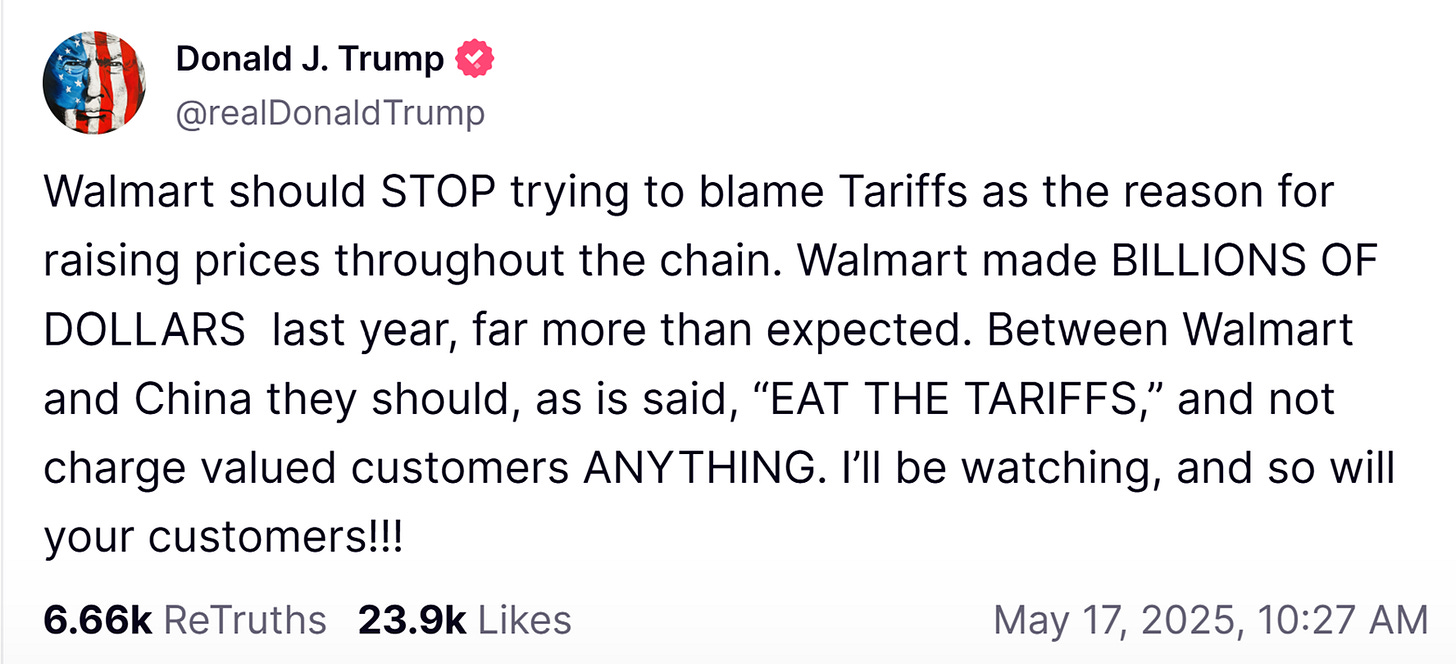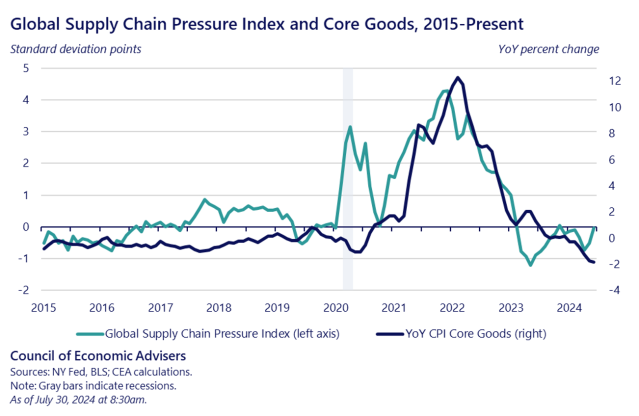Presidents and Prices
Trump wants sellers to "eat the tariffs." Sorry, Donny--ain't gonna happen.
“We’re doing everything we can to lower prices.”
If you saw me holding forth on WHNL (White House North Lawn) back in 2023-24, you heard me, and many of my colleagues, say this. We meant it, and we actually did more than I thought we could in this space (we really did pursue the “five buckets” from the clip). But I always had the nagging add-on phrase in my head, “though there’s not that much we can do.”
This came to mind when observing this Trump tweet from the other day:
In fact, with the major exception that Trump’s own actions caused this, the message isn’t that different from President Biden inveighing against grocery price markups during his watch. While Biden and others framed this as going after price gouging, I never thought that dynamic—collusion to raise prices—was necessarily in play, versus firms taking advantage of unique circumstances to flex their pricing power and raise both their prices and margins. The big grocers’ margins, including Walmart, usually hover around 2-3 percent (i.e., pretty tight margins), but were a few points above that in those years.
How did they get the extra margin? A combination of the pandemic-induced goods and labor supply shocks, which pushed up prices across the economy, and a diminished price elasticity of demand, meaning consumers were less responsive to price hikes, in part because their excess pandemic savings (folks spent much less on services in 2020/21) and fiscal supports. The table below shows that in 2020 alone, real services spending tanked more than 5%, or -$665bn, while real goods spiked up almost 9%, +$460.
Back then, I kept going back in my head to the quote I’d read from the CEO of Chipotle, who said they raised prices on burritos $0.25, and saw no demand falloff, so they pushed a bit further. Part of this was to cover higher costs, but part was to boost margins. In the textbook world, only the former happens (cost-covering). In the real world, as Isabella Weber documents, price setters with market power take advantage of the supply shock to push up prices beyond the cost shock.
As the Biden tweet above showed, a least some of that process seemed to be winding down by ‘24, probably because excess savings and fiscal support had largely burned off, reawakening the price elasticity: consumers became more sensitive to prices.
So, what clout do presidents have to lower consumer prices and how should they use it?
In fact, beyond the bully pulpit, which of course looms especially large for the current president, there’s not that much they can do in this space in normal times. Because we presided over a period with a massive supply shock, we could and did help to get supply chains up and running and that arguably made a helpful contribution to disinflation; note the correlation between improving supply chains and goods disinflation in the figure below. Of course, I’m offering no counterfactual, and chains would have eventually stood back up on their own, but I think our task force helped.
Nor would you generally want presidents to mess with prices. Of course, in an economy where pricing power and bargaining clout, industry concentration, patents, and more are in the mix, it takes a lot more than supply and demand to determine price. But price signals still matter. They still, much like Hayek argued lo these many years ago, are essential for communication to consumers and producers and thereby, the coordination of production.
For example, tariffs raise prices. If they don’t, why would consumers engage in substituting domestic purchases over imports, which is why Trump’s tweet makes no sense, given his stated goals? The passthrough isn’t always one-for-one, but Walmart typically operates within pretty narrow margins and the CFO is within his rights to point this out. Interestingly, polling shows that people are well-primed for this forthcoming price impact, which is why they’re so unhappy about the tariffs, especially over a period when they’re already stressed about price levels.
Am I saying presidents (or other policy officials) should never consider price controls?
No, but the bar should be high. I’m very confident that if you let Trump, or even a more economically literate president set prices, shortages and black markets would quickly develop, as has been the case under other authoritarian regimes that have gone this route (Chile, and even more so, Argentina). Nixon’s early 1970s on-and-off-again foray into price (and wage) controls is widely considered to have initially helped to lower inflation, but distortions ensued, and when the controls finally ended, pent up inflation took off.
There are services and commodities that clear this high bar, such as health care (see also Dean Baker on patent reform in this area). The sector is fraught with market failures, as Ken Arrow documented way back in the early 1960s (though he endorsed single payer, he worried about distortionary impacts of price controls). It is also, uniquely in the U.S., an uncomfortable and inefficient hybrid of public/private spending. The way I see it, once you establish that when someone shows up sick at the ER, they have to be admitted and treated—if I show up hungry at Safeway, they don’t have to feed me!—you’ve taken the system a good stretch out of the market.
Rent price controls also get a lot of attention. There’s evidence that they dampen supply, which is counterproductive given today’s pervasive supply shortages, but when you’re in a downturn with job and income losses, and the rent keeps going up, I think there are reasonable arguments for temporary rent-hike constraints, perhaps leavened with support for low-income renters.
Bottom line, when I hear presidents inveighing against high prices, I recognize that they’re bonding with the people by signaling their annoyance, but that their options are quite limited. And in this case, for Keynes sake, Trump: you did this to yourself!!








If Walmart ate the tariffs, profits would decline or evaporate altogether, leaving less for management and shareholders. Someone has to pay for tariffs and it’s not going to be the exporters, managers or shareholders. That leaves consumers who seem to have figured that out. Here’s hoping that they take their retribution out on the party in power who has caused them completely unnecessary pain.
When will trump's voters realize that his policies never favor them? It's time to call your congressman about Trump's big ugly tax bill.
Deflate Trump's ᗺig ᗺackassward ᗺoondoggle
https://kathleenweber.substack.com/p/trumps-ig-ackassward-oondoggle/comments